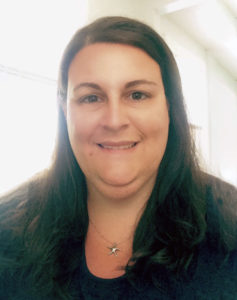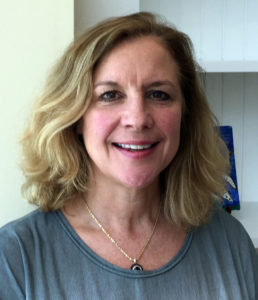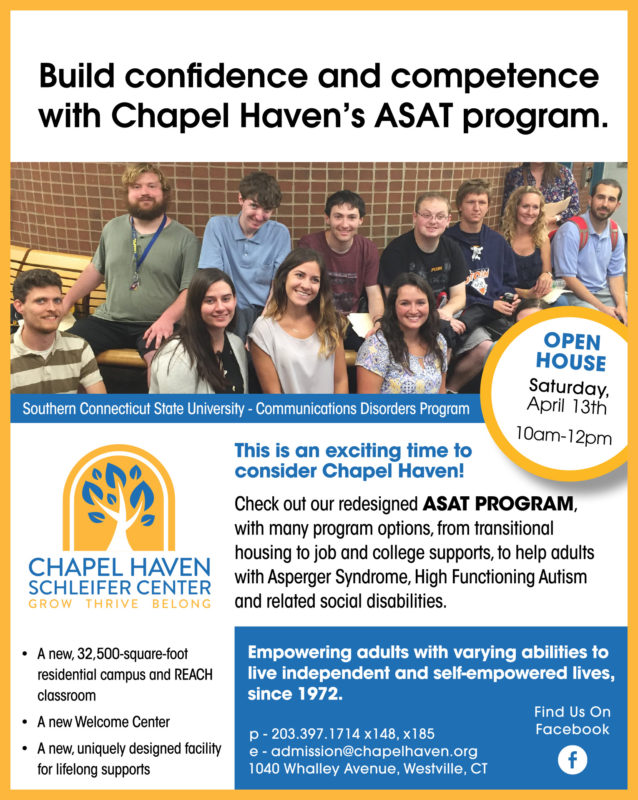In addition to the typical challenges faced by young adults pursuing post-secondary education, those with an autism spectrum disorder (ASD) diagnosis face unique challenges related to deficits in social communication. These include deficits in social-emotional reciprocity, such as taking turns in a conversation; failure to initiate or respond to social interactions; deficits in nonverbal communication, such as difficulty reading and recognizing body language forms (e.g. interpreting another’s emotional state from facial expressions, gestures, intonation and vocal inflection, etc.); and difficulty making and maintaining relationships (American Psychiatric Association, 2013).
- Gina Apicella, M.S., BCBA
- Sarah Davison, M.S., CCC-SLP
With the most recent statistics placing the prevalence of ASD at one in every 59 children (Centers for Disease Control and Prevention, 2014), the number of individuals with ASD attending college will most likely continue to increase in the upcoming years. According to a study evaluating predictors of post-secondary outcomes for students with ASD, Nasamran, Winter, & Los (2017) reported that 62% of their sample, consisting primarily of those described as higher-functioning individuals with ASD, were enrolled in or had graduated from a post-secondary institution. With promising statistics such as these, special attention should be paid to potential communication challenges unique to these young adults and to strategies which support increased communicative success with different partners in a variety of contexts. For college students with ASD, those who utilize social skills more than just “sometimes” were found to be more likely to experience post-secondary success, which is consistent with previous findings (Nasamran et al., 2017).
Communication challenges associated with ASD often manifest in ways related to the social communicative deficits noted above. With this knowledge, we are tasked with identifying ways to make college students with ASD more competent social communicators. One challenge related to deficits in nonverbal communication in those with ASD is difficulty reading facial expressions and accurately interpreting others’ nonverbal cues. In a college classroom for example, determining how one is expected to modify communication behaviors when asking questions, or knowing how frequently one should ask questions or focus on a topic without the inquiry having a negative impact on others can be daunting.
College classes are often much larger than high school classes, which in and of itself comes with unwritten social rules; these rules are more transparent when an individual accurately reads the nonverbal cues of those around him/her when participating in a lecture or group discussion. These communication skills, including how to adjust one’s behavior and verbalizations in response to the feedback received by others can be taught and rehearsed outside of the classroom ahead of time, and can lessen the likelihood of others (peers or professors) becoming upset or frustrated with the individual during class. Video modeling has been proven effective in offering a means of observing a social interaction and focusing in on the nonverbal behaviors of others with the availability of frequent repetition by utilizing a recorded video (Ferraoili & Harris, 2011).
Another challenge related to the core social communicative deficits associated with ASD is in the building and maintaining of relationships (APA, 2013). The college years are often the height of a young adult’s social life, however, building this social life requires many skills. Eaves & Ho (2008) found that 75% of parents identified their children’s social needs as unmet when measuring outcomes of young adults with ASD. Only 33% of the young adult participants, with a mean age of 24, reported having at least one friendship. The training of peers to act as social mentors has well-documented empirical support for its effectiveness with children and adolescents on the autism spectrum (Laushey & Heflin, 2000; Harper, Symon, & Frea, 2008). Peer mentorship programs taking place on university campuses, such as those described by Roberts & Birmingham (2017), Siew et al. (2017), and Wenzel & Rowley (2010) have revealed positive outcomes in college students with ASD, suggesting that training peers to be social mentors may continue to be an effective social skill intervention into young adulthood.
Additional challenges for college students with ASD arise with inevitable casual interactions with peers and/or professors. The nuances of communication and behavior can never all be planned for. Wenzel & Thierfield Brown (2014) suggest creating social rules for various groups of people or situations, such as language and humor that is acceptable when talking with peers versus professors, (referred to as “code-switching”); rules for answering questions with more than a ‘yes’ or ‘no,’ and asking a follow-up question; or utilizing a social script when sending a professional email to a professor. Additionally, preparing for these interactions by utilizing role playing and rehearsal will increase the likelihood of an individual having social success.
With increasing numbers of young adults with ASD choosing to pursue post-secondary education, developing strategies to assist with the social communicative challenges of college as well as the social deficits of ASD are imperative. Many universities are beginning to incorporate non-academic supports into their disability services, with one of the areas of focus being social skills. However, it is essential that young adults with an ASD diagnosis develop social cognition – the ability to comprehend why it is important to use a particular set of social skills in one situation versus another, for example, in order to be more effective communicators overall. For most neurotypical individuals, considering others’ points of view “comes naturally,” and this skill helps humans predict how others will react to their statements and behaviors. We all appreciate when others consider our thoughts and feelings, but it is actually a very complex process that is challenging for individuals with social cognitive deficits and for individuals on the autism spectrum. The good news is that many individuals can learn this multifaceted skill over time. An important part of any young adult’s college experience is social inclusion and satisfaction. Although social satisfaction may be defined differently for everyone, challenges related to autism spectrum disorder should not make satisfaction unattainable.
About Chapel Haven Schleifer Center
Chapel Haven Schleifer Center is an award-winning, nationally accredited school and transition program serving 250-plus adults with a variety of abilities and needs. The Asperger’s Syndrome Adult Transition (ASAT) program is a highly specialized program to help adults gain competence and confidence in social communication while pursuing college, independent living, employment and a satisfying circle of adult friends. Please join us for our Saturday, April 13, 2019 open house. For more information, contact us at admission@chapelhaven.org.
Gina Apicella, M.S., BCBA, is Director of the Asperger’s Syndrome Adult Transition (ASAT) Program and Sarah Davison, M.S., CCC-SLP, is a Speech-Language Pathologist for the ASAT Program at Chapel Haven Schleifer Center, Inc. For more information, visit www.chapelhaven.org.
References
American Psychiatric Association. (2013). Diagnostic and statistical manual of mental disorders (5th ed.). Arlington, VA: Author.
Baio, J., Wiggins, L., Christensen, D.L., Maenner, M.J., Daniels, J., Warren, Z.,…Dowling, N.F. (2018). Prevalence of autism spectrum disorder among children aged 8 years- autism and developmental disabilities monitoring network, 11 Sites, United States, 2014. MMWR Surveill Summ 2018;67(No. SS-6):1–23. DOI: http://dx.doi.org/10.15585/mmwr.ss6706a1
Eaves, L.C. & Ho, H.H. (2008). Young adult outcome of autism spectrum disorders. Journal of Autism and Developmental Disorders, 38, 739-747. doi: 10.1007/s10803-007-0441-x
Reichow, B. (2011). Development, procedures, and application of the evaluative method for determining evidence-based practices in autism. In B. Reichow et al. (Eds.), Evidence-based practices and treatments for children with autism (pp. 25–39). New York: Springer
Ferraioli, S.J., & Harris, S.L. (2011). Treatments to increase social awareness and social skills. In B. Reichow et al. (Eds.), Evidence-based practices and treatments for children with autism (171-196). New York: Springer.
Glennon, T.J. (2001). The stress of the university experience for students with Asperger syndrome. Work: Journal of Prevention, Assessment, & Rehabilitation, 17 (3), 183-190. Retrieved from http://faculty.uml.edu/darcus/47.375/ld/glennon_01.pdf
Harper, C.B., Symon, J.B.G., & Frea, W.D. (2008). Recess is time-in: Using peers to improve social skills of children with autism. Journal of Autism and Developmental Disorders, 38(5), 815-826. doi: 10.1007/s10803-007-0449-2
Laushey, K.M. & Heflin, L.J. (2000). Enhancing social skills of kindergarten children with autism through the training of multiple peers as tutors. Journal of Autism and Developmental Disorders, 30(3), 183-193. doi: 10.1023/A:1005558101038
Nasamran, A., Witmer, S.E., & Los, J.E. (2017). Exploring predictors of postsecondary outcomes for students with autism spectrum disorder. Education and Training in Autism and Developmental Disabilities, 52(4), 343-356. Retrieved from http://daddcec.org/Portals/0/CEC/Autism_Disabilities/Research/Publications/Education_Training_Development_Disabilities/Full_Journals/Nasamran.PDF
Roberts, N. & Birmingham, E. (2017). Mentoring university students with ASD: A mentee-centered approach. Journal of Autism and Developmental Disorders, 47, 1038-1050. doi: 10.1007/s10803-016-2997-9
Siew, C.T., Mazzucchelli, T.G., Rooney, R., & Girdler, S. (2017). A specialist peer mentoring program for university students on the autism spectrum: A pilot study. PLoS ONE, 12(7). Retrieved from https://journals.plos.org/plosone/article?id=10.1371/journal.pone.0180854
Wenzel, C. & Rowley, L. (2010). Teaching social skills and academic strategies to college students with Asperger’s Syndrome. Teaching Exceptional Children; May/June 2010, 42(5), 44-50. Retrieved from https://search.proquest.com/docview/304207698?accountid=166077
Wenzel, C. & Thierfield Brown, J. (2014). Beyond academic intelligence: Increasing college success for students on the autism spectrum. In F. Volkmar et al. (Eds.), Handbook of autism and pervasive developmental disorders- Fourth Edition- Volume 2 (918-931). Hoboken, New Jersey: John Wiley & Sons, Inc.









[…] autismspectrumnews.org – Communication Challenges in College Students With ASD […]